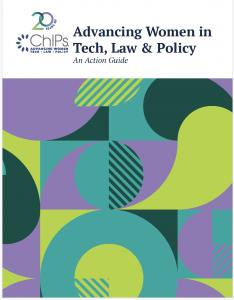
ChIPs Releases 'Women Supporting Women' Action Guide
SAN FRANCISCO, CA, UNITED STATES, June 16, 2025 /EINPresswire.com/ -- A new report from ChIPs Network, the global association of more than 7,000 women in tech and intellectual property law, outlines solutions to persistent barriers to gender parity — including lack of exposure to IP rights, gender bias in workplace cultures, unpredictable schedules, and insufficient work-life integration.
"The contributing factors that keep women from entering, staying and advancing in tech and IP law and policy are multilayered and stubborn, but they aren’t insurmountable," the report says. "Positive change isn't reliant only on big bold moves — it's incremental actions that can and usually power lasting change."
The report is part of ChIPs’ 20th anniversary campaign to improve representation and create workplaces where women are respected, retained, and advanced. It encourages individuals to actively support the advancement of women — including themselves — through the following key actions:
1. Promote women’s innovation and the value of intellectual property rights
On social media, in everyday conversations, at college career days, or high school mock trial competitions, educate young people about IP’s role in innovation and how trademarks and IP rights work. “Never underestimate the power of suggestion,” says Danielle Williams, managing partner, Charlotte, N.C., and co-chair intellectual property group for Winston & Strawn. “I take every opportunity to tell young women they have a place here and to encourage them to observe, participate and engage.”
2. Participate in outreach programs that create opportunities for underrepresented groups in tech and IP
“Connecting with students early and demystifying the patent profession can spark interest,” notes Elaine Spector, partner at Harrity & Harrity, which initiated the Patent Pathways.
The program brings together underrepresented law students, graduates with engineering and hard science degrees, career engineers and scientists, and corporate counsel and law firm attorneys to support entry into patent law. Support includes no-cost patent bar preparation, patent skills training, financial assistance, mentorship and other resources.
3. Take advantage of leadership opportunities in trade and professional organizations
Volunteer to run a committee or event — “You’ll not only build your own business-development skills, but you’ll be in a position to advocate for gender parity across the profession,” Spector says. When given the opportunity to represent your organization on a panel, committee or other external event, insist to organizers that more than one woman take part. Take the opportunity to highlight issues of gender equity and inclusion.
4. When hiring or working with outside counsel, consider the firm’s commitment to gender and other forms of diversity
“Companies and clients are increasingly adding women and diverse-owned law firms to their outside counsel panels,” notes Karineh Khachatourian, managing partner at KXT Law. “It’s not about decreasing opportunities for majority firms but supporting women and diverse-owned law firms to better reflect the diverse perspectives and communities they serve.
"Companies want to work with firms that not only claim to value diversity, but actively demonstrate it through their ownership, hiring practices, team compositions and inclusion policies. “I expect the demand for diverse teams will persist because diversity in counsel is a key factor in delivering high-quality, effective legal strategies that drive success in the innovation space,” she continued.
5. Be a myth buster
While not having a STEM degree may discourage some women from pursuing careers in innovation and IP law and policy, a STEM background is not required to succeed. “Since most juries and judges do not have STEM degrees the most important trait of an IP litigator is to be able to tell a story and explain the technology in a simple and understandable way,” says Karineh Khachatourian of KXT Kaw.
“Some of the best IP litigators I know do not have technical degrees. Encouraging participation, regardless of educational background, is key to fostering innovation and inclusivity. Imagine how different the world would be if someone told Steve Jobs ‘no’ because he did not have a technical degree.”
ABOUT CHIPS
ChIPs Network is a nonprofit organization representing more than 7,000 members in 28 regional chapters in North America, Europe, Latin America, Asia-Pacific and Africa. ChIPs advances and connects women in technology, law and policy. We accelerate innovation throughdiversity of thought, participation, and engagement. ChIPs is open to all who share its mission.
Olivia Moorer
ChIPs Network Inc.
+1 773-750-1798
email us here
Visit us on social media:
LinkedIn
Instagram
Facebook
YouTube
X
Distribution channels: IT Industry, International Organizations, Law
Legal Disclaimer:
EIN Presswire provides this news content "as is" without warranty of any kind. We do not accept any responsibility or liability for the accuracy, content, images, videos, licenses, completeness, legality, or reliability of the information contained in this article. If you have any complaints or copyright issues related to this article, kindly contact the author above.
Submit your press release
